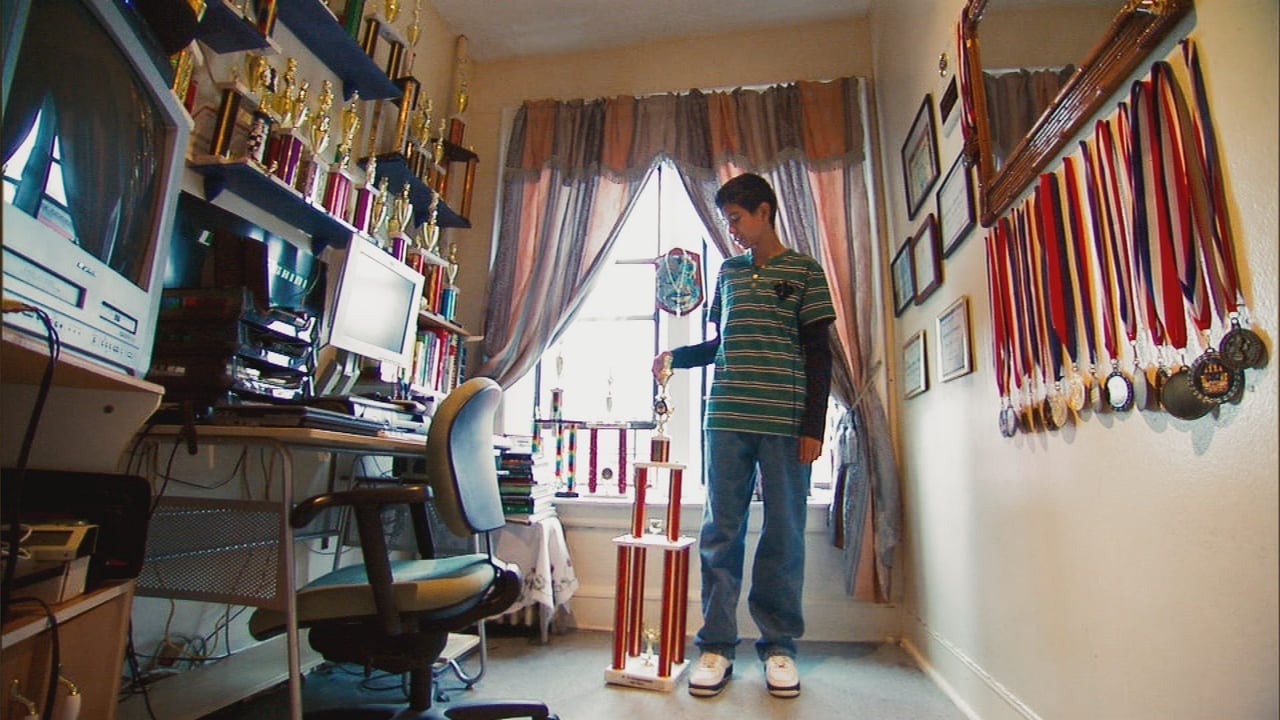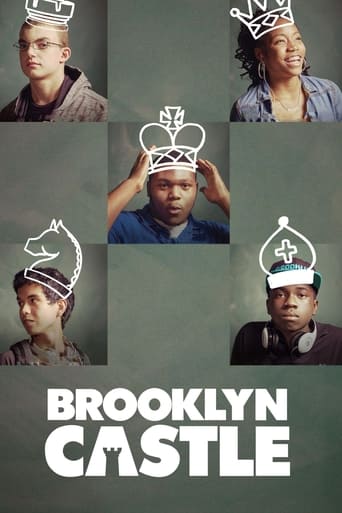Leon Breaux
The film Brooklyn Castle offers an intimate and emotionally powerful view into the world of junior and high school public schools in Brooklyn and Manhattan in the late 2000s. Told mainly from the point of view of Intermediate School 318's vice principal, John Galvin, who adds an informative, pragmatic, yet deeply caring voice to the story, we follow the travails and triumphs of their star chess team. The story takes us through the tough requirements for interscholastic chess competition and gives us insight into the minds of several grand masters as well as the student's chess coach and teacher, Elizabeth Vicary. From this intense and dedicated teacher we learn the benefits to students of such a rigorous program: how chess allows students turned off by other learning to delve deeply into a subject with many openings for their interest, and how they learn that truth does not only depend on a simple notion of right and wrong because of the variety of options and outcomes in a chess game (apparently there are more possible chess games than atoms in the universe).We learn about Oghenakpobo Efekro (Pobo), a first-generation American born of Nigerian parentage, and his hugely effusive seventh and eighth grade personality as he takes charge and takes responsibility, triumphing both in chess and as class president of I.S. 308; we learn of little Justus, a fifth grader with a incoming ranking of 1900 (Albert Einstein ranked about 1800) and his successful confrontations with the reality of failure; of Patrick, a boy with ADHD and the heart of a warrior, struggling with all his might to win a single game in a big tournament (he advises us in one of the film's many disarmingly intimate short interviews that, though many people tell him he can learn from losing, he believes this is bullshit), and Rochelle Ballantyne, a young black woman with a reserved personality but the intellectual horsepower to have a prestigious New York City public school offer her, through special funding directly from the school board, a personal grand master chess coach. She also won, as a high school freshman, a full scholarship to University of Texas at Dallas by winning the national title.A large part of the film deals with the effects of the 2008 financial crisis on I.S. 318 and their hard-fought battles to retain funding through involving the community, especially students' parents. As a Title I school, meaning at least 60% of the students live in poverty (about 70% at I.S. 318), this money has a huge impact on students' lives and future opportunities. Many of these students, without extracurricular programs (besides chess, think band, art, music, and after school clubs and activities) would have little opportunity to experience these things and far more opportunity to get in trouble with the law outside (or inside) of school. When we see such students as Pobo, who admitted in an interview that if not for chess, he would have kept up his bad boy ways with who knows what outcome -- certainly not talking to us for this film -- and Rochelle, who without the support and opportunities offered could not have succeeded in any manner even close to what she accomplished, the kids drive home the unquestionable importance of adequate resources for high-poverty schools.Perhaps the most endearing quality the film possesses lies in its lack of overt political spin. Too many educational films give a one-sided approach that leaves the viewer questioning the motives of the producers. This FilmBuff (digital distributor) picture, however, works on its own as an independent film. John Sloss, the co-founder of FilmBuff and the film's producer Producers Distribution Agency (PDA) has academy award credits for The Fog of War and Boys Don't Cry, along with credit for such films as City of Hope and A Scanner Darkly, among others. The broad-based talent shows: the film's qualities easily appeal to a large audience on several levels, neatly straddling the lines between documentary, biography, personal empowerment, and the outright power of journalistic storytelling. One of the directors, Brian Schulz, has won three Emmys for his YES Yankeeography series, and John Sloss has served as a graduate professor at Tisch School of the Arts at New York University. Both the film's entertainment value and local knowledge of Brooklyn life show their influences.Portrayed with little sympathy, however, are the people responsible for the financial crisis. In the words of vice principal John Galvin, the students were being punished for something that was not their fault.The film captivated me from beginning to end. In such a well-crafted, well-researched piece of work, I am hard pressed to find any faults. I would only say that some of the important statistics the film invokes flash by on the screen a bit too quickly, and I found myself reviewing them while pausing the movie, something I'd be unable to do in a theater. Perhaps showing such statistics for four seconds, say, instead of two, might be helpful in this regard.How do we keep brown kids from poor families in school and make them productive, caring citizens? The ancient game of chess, properly organized and taught, appears to offer an inroad to many. But the problem, as ever, lies in resources. I.S. 318 was hit hard by the financial crisis, forcing the staff, community and students to fight tooth and nail to continue their effective and worthy work with the hearts and minds of young people. The final question for the audience may well be this: are we willing, as a society, to do whatever it takes to maintain a quality education for all in the face of draconian financial cuts? In the words of Pobo, in a letter he drafted to a politician (the entire school wrote letters as well) it should not even be a question. I have to agree.
bob the moo
Hard not to compare this film to Spellbound in that it shows students working very hard in an intellectual pursuit in order to improve themselves and open up new avenues for their futures. This is an unfortunate comparison because really this film is not as good as Spellbound on many levels and, to be honest, even without the direct comparison it is easy to see weaknesses within Brooklyn Castle as a documentary. I say "as a documentary" because as a general film it works pretty well despite running a little longer than it can bear. The main reason it works is because of the characters involved; the teachers are passionate, the students are colorful, engaged and driven and generally the viewer invests in them because of how likable and interesting they are as people. This is something the filmmakers have done well because, while some of the kids are instantly likable, some of them are a little bit harder to get close to and in the edit good selections have been made to bring their characters across the best.In this way we care who wins and loses when the film inevitably comes down to the final contests. All of this is good and I liked the film for that but what disappointed me was that the attempts to speak bigger than them doesn't work as well. In terms of showing the value of after-school activities it is a no-brainer to see that this group of kids benefit greatly but I would have liked the film to do more with stats to show that this is true generally by contrasting with other schools and painting an undeniable picture of the importance of these programs. It does this well through the main thrust but there was room for more. Likewise the impact of budget cuts, it shows them and discusses them but it really doesn't hit it home and to be honest I watched the film thinking that actually 2-4% cut was not that bad and seemed to be well managed. I'm guessing this is not the message the film was trying to present (nor is it the case either I imagine) but the lack of bigger picture on the importance and the lack of bigger picture on the impact of the cuts really missed the opportunity to hit this message hard. The point of the film was not just to entertain with the story of this particular collection of students or this school, but on top of that to use them to make a bigger point and educate and engage the viewer (by drawing them into the former and then hitting their engaged-brains with the latter).It is a shame that it doesn't do this as well as it should because it would have been a much stronger film for it. As it is, the film still works as an entertaining, engaging and uplifting look at these specific students, but just the important messages are not as well delivered as they should have been and that is a real disappointment for this as a documentary. Well worth seeing for what it does well though.
Robyn Nesbitt (nesfilmreviews)
Fantastic, inspirational, warm-hearted true story--a can't miss documentary. Goes on a little longer than it probably should, but watching the improbable story unfold is unquestionably captivating."Brooklyn Castle" is a documentary about I.S. 318 - an inner-city school where more than 65 percent of students are from homes with incomes below the federal poverty level - that also happens to have the best junior high school chess team in the country. Chess has transformed the school from "school in need of improvement" in 2003, to one of New York City's best. But a series of recession-driven pubic school budget cuts now threaten to undermine those hard-won successes.The second act of the film loses its sense of direction, but finds its footing again in the third act when the focus is on the kids and the intense competition of the tournaments. If you feel that the country's educational system is in a perpetual downward spiral, and no one really cares, be sure to give it a watch. It's sure to give you at least some hope for our nation's future.

